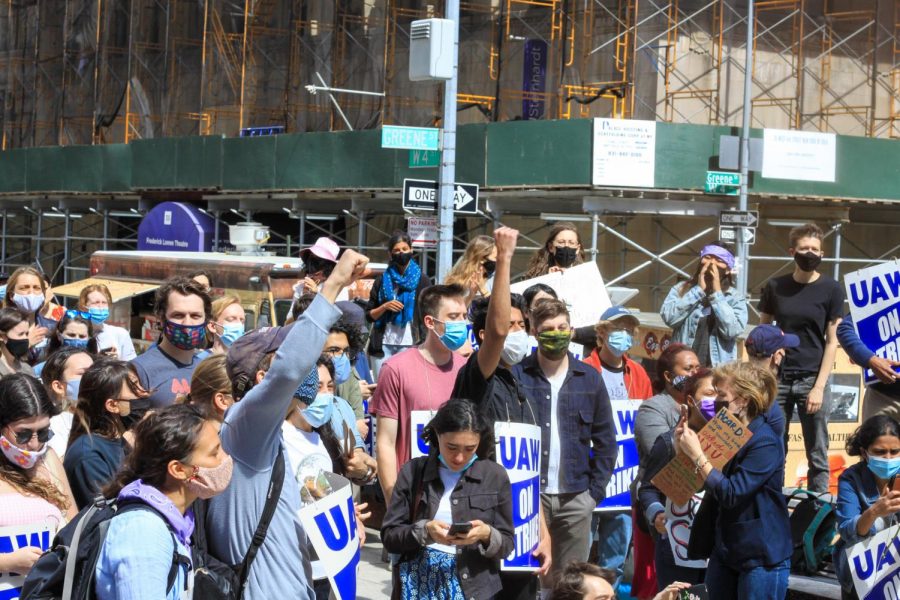How the GSOC strike is impacting finals
With TAs on strike, students are frustrated with professors’ management of final exams.
The Graduate Student Organizing Committee’s ongoing strike has changed how many students’ academic performance will be evaluated this semester. Once the strike began, professors began telling their students that if the GSOC strike continued into final exams, the format of the exams would be changed. (Staff Photo by Alexandra Chan)
May 6, 2021
The Graduate Student Organizing Committee’s ongoing strike has changed how many students’ academic performance will be evaluated this semester. As teaching assistants, graduate student workers are often responsible for grading tests and essays. Some classes are taught entirely by grad student workers. Since striking TAs are neither teaching nor grading final exams, many professors have changed the exams’ formats to make the grading process easier.
Once the strike began, professors began telling their students that if the GSOC strike continued into final exams, the format of the exams would be changed. Some students with classes in the College of Arts and Science, such as Gallatin junior Avital Krifcher, reported that short-answer or essay finals in larger classes have been reformatted as multiple-choice exams so that NYU Classes can automatically grade them.
Other CAS professors have opted for forum posts on NYU Classes in lieu of a final exam. CAS sophomore Julia Wrobel must complete a forum post for her sociology final rather than answer numerous short-answer responses as was planned.
“I think it’s definitely helpful,” Wrobel said. “We were supposed to have a review session before the exam with our TAs but they went on strike. We weren’t able to do that. So I feel like we missed out on that.”
GSOC’s strike has garnered support from Sen. Bernie Sanders (I-Vermont) and coverage in The New York Times. Gallatin sophomore Alyssa Hannah believes that altering or canceling finals is a way for professors to acknowledge the strike and show solidarity.
“In two of my classes we didn’t talk about it,” Hannah told WSN. “We still have our normal final papers due at the same time which is kind of weird.”
Krifcher recognizes that the strike situation is complicated and that each class will be affected differently, depending on the size and subject of the course.
“I don’t think I’m in the worst situation out of many people,” Krifcher told WSN. “Some people have classes — math classes or science classes — where their teachers are no longer a resource for them. I can imagine that’s a really huge detriment to their class and they actually might fail because of that, and I’m certainly not in that situation.”
Although Krifcher is not in a situation where she might fail, she said she still did not know the format of her May 6 exam. She believes there should be more communication regarding final exams now that TAs are no longer the primary point of contact.
“I have no problem with finals being changed,” Krifcher said. “I completely understand that the professors can’t do the same work for a class with upwards of 100 students. I’ve been a bit frustrated because I don’t think that our professors are giving us a lot of guidance on the repercussions that we’re going to face or even what our finals aren’t necessarily going to look like.”
A CAS sophomore, who asked to remain anonymous, said a professor in the Wilf Family Department of Politics is pressuring students to undermine the strike. The student, who is enrolled in the professor’s class, said the professor told students they would receive zeros if they refused to email screenshots of TA-graded work. The professor has since changed the requirements to allow students to upload work to NYU Classes.
“We just felt like we were forced to pick between our TAs or getting an actual grade at the end of the year,” the CAS sophomore said. “[The professor] actually changed a lot about the syllabus after the TAs left as well.”
According to the CAS sophomore, the professor stopped grading attendance after the TAs started striking — without informing students how the grade percentage would be redistributed.
“The attendance was recorded by the TAs and [the professor] couldn’t get that information either, and so [the professor] took out the attendance part of it, which was actually a huge deal,” they said. “There’s a lot of us relying on that as a sort of grade boost.”
The uncertainty of finals season this year has been both helpful and stressful for students concerned about grades due to remote learning. One of Wrobel’s professors changed the grading curve when GSOC went on strike so that no one would get below a B-minus. Other students, however, are concerned their grades will be detrimentally impacted in classes that had TAs.
“I think professors should be more accommodating,” Krifcher said. “At the end of the day, we are still students and we are still putting in the work, and we want to make sure that the work that we’re putting in is being graded fairly and that it’s not for nothing.”
The CAS sophomore said many students in their politics class are anxious about the final exam and the overall course grade.
“[The professor] was thinking whether or not we should have a final at all and then [the professor] had us vote,” the CAS sophomore said. “How are we able to determine whether or not we want a final if we don’t even know what our current standing in the class is? We were like, ‘Can we wait until you grade it so we can make an actual decision?’ And [the professor] was like, ‘No, you have to choose now.’”
According to Krifcher, the best solution for this situation is clear communication and understanding between undergraduate students and professors.
“The strike should still be happening,” Krifcher said. “ I just think that because of the timing and because of everything, it’s really made it even harder for students who have had a really hard semester as it is now without accommodations and adjustments. It’s made finals season a lot more challenging and confusing and worrying. I think overall clear communication is the best way to go.”
Email Rachel Fadem at [email protected]

























































































































































